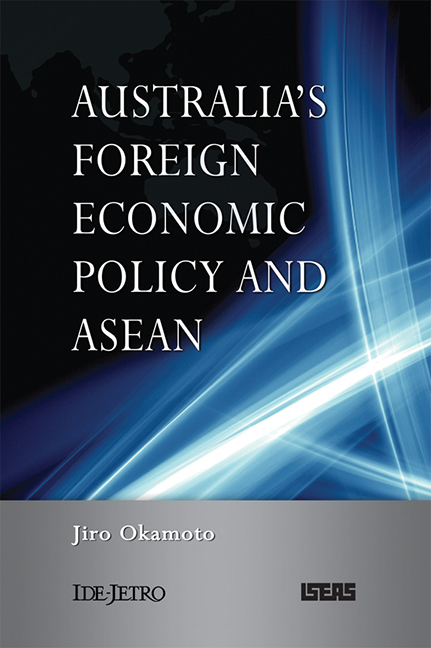Book contents
- Frontmatter
- Contents
- List of Figures and Tables
- Abbreviations and Acronyms
- Acknowledgements
- 1 Introduction
- 2 An Analytical Framework
- 3 State-Society Coalitions and Australia's Foreign Economic Policy
- 4 Australia and the Formation of ASEAN
- 5 The Trade Liberalizers and Asia-Pacific Regionalist Strategies
- 6 The Development of ASEAN Regionalism and the AFTA–CER Linkage Dialogue
- 7 The Bilateralists and their ASEAN Policy
- 8 Conclusion
- Appendix: Foreign Economic Policy-Related Ministers in Australia since 1941
- References
- Index
- About the Author
2 - An Analytical Framework
Published online by Cambridge University Press: 21 October 2015
- Frontmatter
- Contents
- List of Figures and Tables
- Abbreviations and Acronyms
- Acknowledgements
- 1 Introduction
- 2 An Analytical Framework
- 3 State-Society Coalitions and Australia's Foreign Economic Policy
- 4 Australia and the Formation of ASEAN
- 5 The Trade Liberalizers and Asia-Pacific Regionalist Strategies
- 6 The Development of ASEAN Regionalism and the AFTA–CER Linkage Dialogue
- 7 The Bilateralists and their ASEAN Policy
- 8 Conclusion
- Appendix: Foreign Economic Policy-Related Ministers in Australia since 1941
- References
- Index
- About the Author
Summary
As the economic interdependence of countries continues to deepen and become more complex, it is widely acknowledged that it is difficult to draw a sharp line between foreign and domestic economic policies. Both international and domestic factors matter in foreign economic policymaking. Yet how domestic policy processes matter in explaining the foreign economic policies of states remain major questions in international relations theory. An important question is whether individual intention or circumstantial constraints are the primary factor in explaining states’ foreign policy behaviour.
This chapter sets out a framework for analysing the formation of, and changes in, Australia's foreign economic policy. First, the international system is seen as the environment in which a state like Australia, which alone does not normally possess the capability to have a major impact on the international system, must operate. For Australia, international environmental factors inevitably restrict foreign economic policy choice. In most cases, Australia has to react to, rather than try to exercise control over, changes in the international environment.
Second, while the international environment does restrict the foreign policy behaviour of a smaller state, this does not necessarily mean that the environment forces a state to take one particular approach on particular policy issues. Rather, the international environment imparts a certain range of foreign economic policy options that a smaller state can pragmatically pursue. Within this range of policy options, a state like Australia, for example, can attempt to realize its policy goals by choosing a policy (or a set of policies) that it perceives as being in its best interest.
Third, the state' choice of foreign economic policy is influenced by how it relates to the domestic society and polity, represented mainly by a variety of societal and political interest groups. State-society relations need to be brought into consideration in the explanation of foreign economic policy formation. As a state tries to implement policies according to perceptions of contemporary and future domestic needs, it has, to a certain degree, to be receptive to policy demands of the societal and political interest groups. But the state is not a mere agent of domestic interest groups. It can play a role in forming policy preferences on how best policy goals can be achieved through certain ideas, knowledge and processes.
- Type
- Chapter
- Information
- Australia's Foreign Economic Policy and ASEAN , pp. 17 - 33Publisher: ISEAS–Yusof Ishak InstitutePrint publication year: 2010

